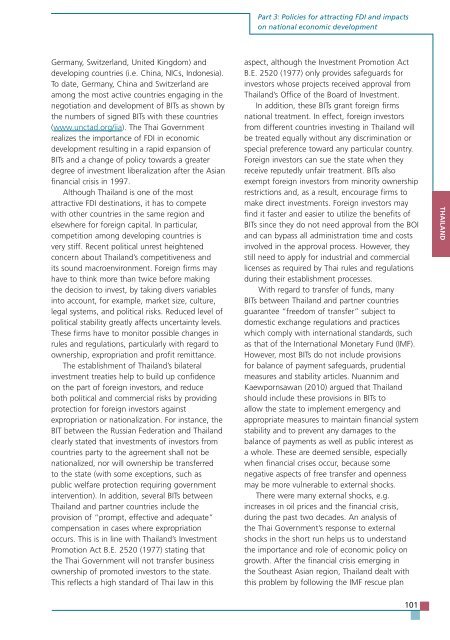TRENDS AND IMPACTS OF FOREIGN INVESTMENT IN DEVELOPING COUNTRY AGRICULTURE
TRENDS AND IMPACTS OF FOREIGN INVESTMENT IN DEVELOPING COUNTRY AGRICULTURE
TRENDS AND IMPACTS OF FOREIGN INVESTMENT IN DEVELOPING COUNTRY AGRICULTURE
Create successful ePaper yourself
Turn your PDF publications into a flip-book with our unique Google optimized e-Paper software.
Germany, Switzerland, United Kingdom) and<br />
developing countries (i.e. China, NICs, Indonesia).<br />
To date, Germany, China and Switzerland are<br />
among the most active countries engaging in the<br />
negotiation and development of BITs as shown by<br />
the numbers of signed BITs with these countries<br />
(www.unctad.org/iia). The Thai Government<br />
realizes the importance of FDI in economic<br />
development resulting in a rapid expansion of<br />
BITs and a change of policy towards a greater<br />
degree of investment liberalization after the Asian<br />
financial crisis in 1997.<br />
Although Thailand is one of the most<br />
attractive FDI destinations, it has to compete<br />
with other countries in the same region and<br />
elsewhere for foreign capital. In particular,<br />
competition among developing countries is<br />
very stiff. Recent political unrest heightened<br />
concern about Thailand’s competitiveness and<br />
its sound macroenvironment. Foreign firms may<br />
have to think more than twice before making<br />
the decision to invest, by taking divers variables<br />
into account, for example, market size, culture,<br />
legal systems, and political risks. Reduced level of<br />
political stability greatly affects uncertainty levels.<br />
These firms have to monitor possible changes in<br />
rules and regulations, particularly with regard to<br />
ownership, expropriation and profit remittance.<br />
The establishment of Thailand’s bilateral<br />
investment treaties help to build up confidence<br />
on the part of foreign investors, and reduce<br />
both political and commercial risks by providing<br />
protection for foreign investors against<br />
expropriation or nationalization. For instance, the<br />
BIT between the Russian Federation and Thailand<br />
clearly stated that investments of investors from<br />
countries party to the agreement shall not be<br />
nationalized, nor will ownership be transferred<br />
to the state (with some exceptions, such as<br />
public welfare protection requiring government<br />
intervention). In addition, several BITs between<br />
Thailand and partner countries include the<br />
provision of “prompt, effective and adequate”<br />
compensation in cases where expropriation<br />
occurs. This is in line with Thailand’s Investment<br />
Promotion Act B.E. 2520 (1977) stating that<br />
the Thai Government will not transfer business<br />
ownership of promoted investors to the state.<br />
This reflects a high standard of Thai law in this<br />
Part 3: Policies for attracting FDI and impacts<br />
on national economic development<br />
aspect, although the Investment Promotion Act<br />
B.E. 2520 (1977) only provides safeguards for<br />
investors whose projects received approval from<br />
Thailand’s Office of the Board of Investment.<br />
In addition, these BITs grant foreign firms<br />
national treatment. In effect, foreign investors<br />
from different countries investing in Thailand will<br />
be treated equally without any discrimination or<br />
special preference toward any particular country.<br />
Foreign investors can sue the state when they<br />
receive reputedly unfair treatment. BITs also<br />
exempt foreign investors from minority ownership<br />
restrictions and, as a result, encourage firms to<br />
make direct investments. Foreign investors may<br />
find it faster and easier to utilize the benefits of<br />
BITs since they do not need approval from the BOI<br />
and can bypass all administration time and costs<br />
involved in the approval process. However, they<br />
still need to apply for industrial and commercial<br />
licenses as required by Thai rules and regulations<br />
during their establishment processes.<br />
With regard to transfer of funds, many<br />
BITs between Thailand and partner countries<br />
guarantee “freedom of transfer” subject to<br />
domestic exchange regulations and practices<br />
which comply with international standards, such<br />
as that of the International Monetary Fund (IMF).<br />
However, most BITs do not include provisions<br />
for balance of payment safeguards, prudential<br />
measures and stability articles. Nuannim and<br />
Kaewpornsawan (2010) argued that Thailand<br />
should include these provisions in BITs to<br />
allow the state to implement emergency and<br />
appropriate measures to maintain financial system<br />
stability and to prevent any damages to the<br />
balance of payments as well as public interest as<br />
a whole. These are deemed sensible, especially<br />
when financial crises occur, because some<br />
negative aspects of free transfer and openness<br />
may be more vulnerable to external shocks.<br />
There were many external shocks, e.g.<br />
increases in oil prices and the financial crisis,<br />
during the past two decades. An analysis of<br />
the Thai Government’s response to external<br />
shocks in the short run helps us to understand<br />
the importance and role of economic policy on<br />
growth. After the financial crisis emerging in<br />
the Southeast Asian region, Thailand dealt with<br />
this problem by following the IMF rescue plan<br />
101<br />
THAIL<strong>AND</strong>


